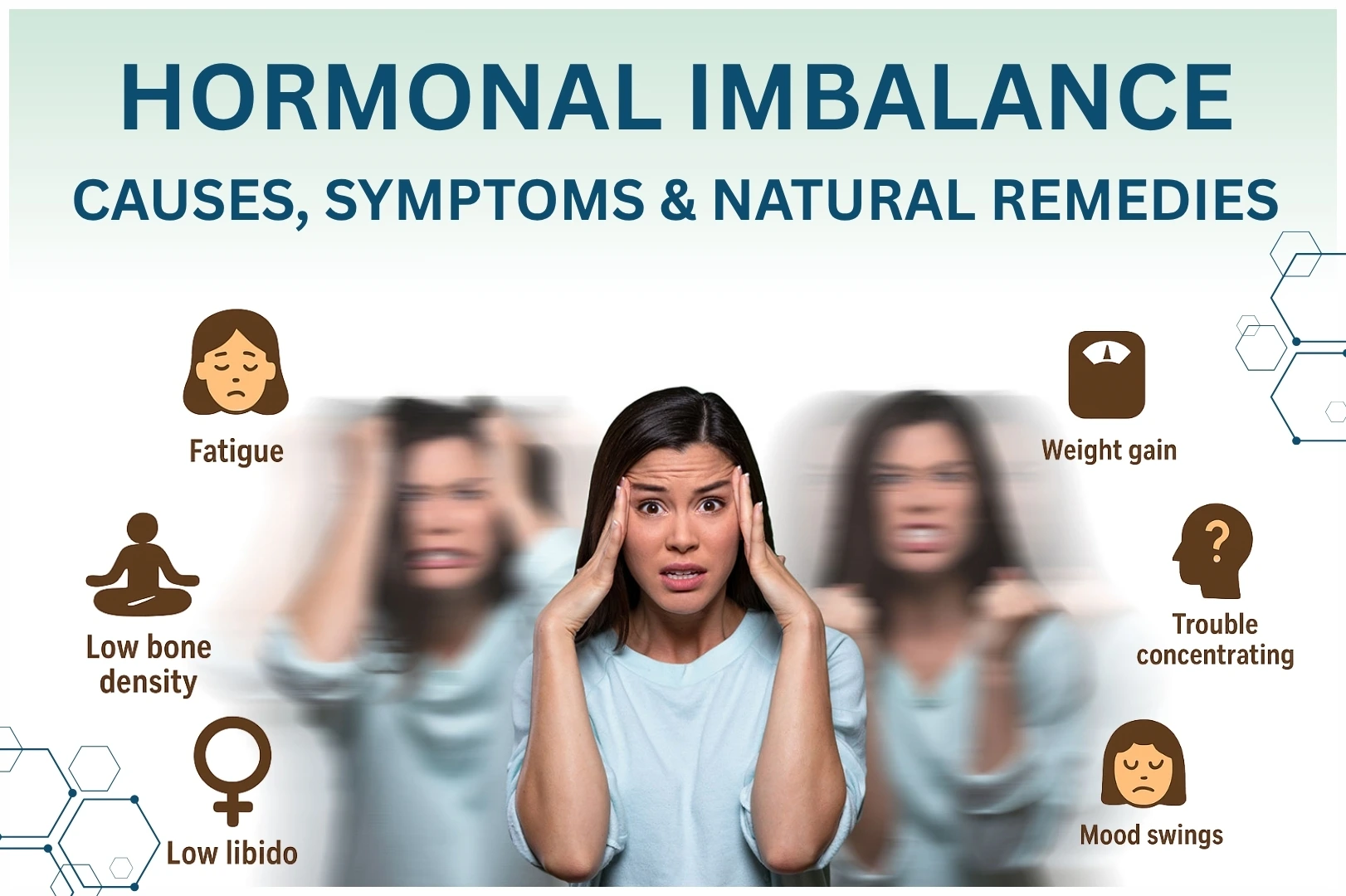Hormonal Imbalance: Causes, Symptoms & Natural Remedies

Learn Everything About Hormonal Imbalance
Hormones are the body’s chemical messengers, tiny but powerful signals that regulate almost every process in your body. From growth, metabolism, and reproduction to mood, energy, and sleep, hormones maintain balance in your system. When this delicate balance is disrupted, hormonal imbalance occurs, leading to a wide range of health issues that can affect both physical and emotional well-being.
Hormonal imbalance is more common than most people realize. Women often face it during puberty, pregnancy, perimenopause, and menopause, while men may experience it with aging, stress, or certain medical conditions. Modern lifestyles, filled with stress, poor diets, lack of sleep, and exposure to toxins, have made hormonal imbalances increasingly widespread.
This complete guide will help you understand:
- What hormonal imbalance is
- The causes and symptoms in men and women
- How it is diagnosed
- Natural and medical treatment are available
- Foods, exercises, and yoga for restoring balance
- Prevention tips for long-term hormonal health
By the end, you’ll have a roadmap to not just treat but also naturally restore hormonal balance for better energy, mood, and overall health.
What is Hormonal Imbalance?
Hormonal imbalance occurs when there are abnormally high or low levels of a hormone in the bloodstream. Because hormones regulate essential body functions, even a slight imbalance can have significant health issues.
Key Hormones Involved in Hormonal Balance
- Estrogen & Progesterone – Regulate menstrual cycles, fertility, and bone health in women.
- Testosterone – Controls male sexual health, muscle growth, and energy.
- Thyroid hormones (T3, T4, TSH) – Manage metabolism, weight, and energy.
- Insulin – Regulates blood sugar and metabolism.
- Cortisol – The stress hormone; impacts sleep, mood, and immunity.
- Melatonin – Controls sleep cycles.
- Prolactin – Influences milk production and reproductive health.
When any of these hormones fluctuate abnormally, symptoms such as fatigue, mood swings, weight changes, acne, irregular periods, or infertility may occur.
What Are The Symptoms of Hormonal Imbalance?
Hormonal imbalance can look different depending on which hormones are affected (thyroid, estrogen, progesterone, testosterone, cortisol, insulin, etc.). But there are some common symptoms you can watch for:
General Symptoms
- Unexplained weight gain or weight loss
- Constant fatigue or low energy
- Mood swings, anxiety, irritability, or depression
- Sleep problems (insomnia or excessive sleepiness)
- Brain fog, poor concentration, and memory issues
- Hair thinning, hair loss, or unusual hair growth
- Skin issues: acne, dry skin, or sudden rashes
- Reduced libido (low sex drive)
- Digestive issues such as bloating or constipation
Hormonal Imbalance Symptoms in Females
- Irregular or missed periods
- Heavy, painful, or very light periods
- Hot flashes, night sweats (especially around menopause)
- Breast tenderness or fibrocystic breasts
- Infertility or difficulty conceiving
- Polycystic Ovary Syndrome (PCOS) signs: acne, excess facial/body hair, weight gain
Hormonal Imbalance Symptoms In Men
- Low testosterone symptoms (fatigue, low libido, erectile dysfunction)
- Muscle loss and increased belly fat
- Hair loss or thinning
- Mood changes, irritability, depression
- Enlarged breast tissue (gynecomastia)
Main Causes of Hormonal Imbalance
1. Lifestyle Factors
- An unhealthy diet high in sugar, refined carbs, alcohol, and processed foods affects insulin and sex hormones.
- Chronic stress raises cortisol, which disrupts thyroid, estrogen, progesterone, and testosterone.
- Lack of sleep reduces melatonin and growth hormone and increases cortisol.
- A sedentary lifestyle leads to weight gain, insulin resistance, and testosterone decline.
2. Medical Conditions
- Polycystic Ovary Syndrome (PCOS) causes excess androgens in women.
- Thyroid disorders (hypothyroidism, hyperthyroidism) affect metabolism and energy.
- Diabetes / Insulin resistance disrupts glucose and fat metabolism.
- Obesity produces excess fat tissue produces estrogen and inflammatory chemicals.
- Adrenal disorders: Addison’s disease, Cushing’s syndrome.
- Tumors (benign or malignant) in the pituitary, adrenal, or thyroid glands.
3. Natural Life Stages
- Puberty hormone surges can cause acne, mood changes, and irregular cycles.
- Pregnancy & Postpartum rapid estrogen and progesterone changes.
- Perimenopause & Menopause declines in estrogen and progesterone.
- Andropause (male menopause)is a gradual testosterone decline in men.
4. Environmental & External Factors
- Endocrine disruptor chemicals in plastics (BPA), pesticides, and parabens in cosmetics.
- Medications include birth control pills, steroids, or certain psychiatric drugs.
- Radiation or chemotherapy may damage glands that regulate hormones.
Hidden Causes of Hormonal Imbalance
1. Poor Gut Health
Your gut and hormones are closely linked (the gut–hormone axis).
- An unhealthy gut microbiome increases inflammation and affects estrogen metabolism (a condition called estrogen dominance).
- Leaky gut can trigger immune reactions that disturb thyroid hormones.
Signs: bloating, IBS, frequent digestive issues.
2. Liver Dysfunction
The liver is responsible for breaking down and eliminating excess hormones (especially estrogen).
- A sluggish liver can lead to estrogen buildup, worsening PMS, weight gain, and mood swings.
- High alcohol intake or processed food damages liver detox pathways.
3. Nutrient Deficiencies
Certain vitamins and minerals are essential for hormone production.
- Vitamin D – impacts reproductive and thyroid hormones.
- Magnesium – regulates cortisol and supports sleep.
- Zinc – key for testosterone and fertility.
- B vitamins – essential for adrenal and thyroid function.
4. Chronic Inflammation
Long-term inflammation (from poor diet, stress, or autoimmune conditions) disrupts insulin, thyroid hormones, and sex hormones.
5. Overuse of Stimulants
- Too much caffeine or energy drinks overstimulates cortisol and adrenaline.
- Nicotine and alcohol disturb reproductive and sleep hormones.
6. Hidden Infections & Autoimmune Disorders
- Conditions like Hashimoto’s thyroiditis or autoimmune adrenalitis cause hormonal imbalances that are often missed in routine checkups.
When is the Best Time to Test for Hormone Imbalance?
1. Sex Hormones (Estrogen, Progesterone, Testosterone)
- Women:
- Estrogen (Estradiol): Day 3 of the menstrual cycle (to check ovarian reserve).
- Progesterone: Day 21 (or about 7 days after ovulation) to confirm ovulation.
- FSH & LH: Day 3 (help diagnose fertility issues, PCOS, or menopause).
- Testosterone (total/free): Morning blood draw, ideally around Day 3–7 of cycle.
- Men:
- Testosterone: Early morning (7–10 AM), when levels peak.
2. Thyroid Hormones (TSH, Free T3, Free T4, Reverse T3)
- Can be tested anytime in the morning, fasting preferred.
- Avoid biotin supplements for 48 hours before the test, as they can distort results.
3. Cortisol (Stress Hormone)
- Morning (around 8 AM): Should be at its highest.
- Evening (around 8 PM): Should be low.
Doctors often order a cortisol day curve (multiple samples) or a saliva test to track patterns.
4. Insulin & Blood Sugar-Related Hormones
- Fasting insulin/glucose: After 8–12 hours of fasting.
- HbA1c: Anytime, as it reflects a 3-month average blood sugar.
5. Melatonin (Sleep Hormone)
- Usually measured via saliva or urine, taken at night before bed.
Side Effects of Hormonal Imbalance
Hormones regulate metabolism, mood, sleep, reproduction, and energy. When they go out of balance, the side effects can show up in almost every system of the body.
1. Reproductive & Sexual Health Issues
- Women:
- Irregular or absent periods
- Infertility or difficulty conceiving
- Miscarriages
- Low libido
- Painful or heavy menstruation
- Menopause symptoms (hot flashes, vaginal dryness)
- Men:
- Erectile dysfunction
- Low sperm count
- Reduced libido
- Gynecomastia (male breast tissue growth)
- Testicular shrinkage
2. Metabolic & Weight-Related Side Effects
- Unexplained weight gain or stubborn belly fat (especially with high cortisol or insulin resistance)
- Sudden weight loss (hyperthyroidism)
- Increased appetite or constant cravings
- Type 2 diabetes (from insulin imbalance)
3. Mental & Emotional Health
- Anxiety, depression, irritability
- Mood swings & brain fog
- Poor memory and concentration
- Sleep disturbances (insomnia, early waking)
4. Skin, Hair & Appearance
- Persistent acne (especially along the jawline in women with PCOS)
- Thinning scalp hair or hair loss
- Excessive facial/body hair in women (hirsutism)
- Dry skin or eczema flare-ups
- Premature aging signs
5. Energy & Immune Function
- Constant fatigue even after rest
- Weak immune system (frequent infections)
- Inflammation and joint pain
- Slow recovery from illness
6. Long-Term Risks if Untreated
- Infertility (men & women)
- Osteoporosis (low estrogen/testosterone weakens bones)
- Heart disease (imbalances in thyroid, insulin, or estrogen/testosterone)
- Hypertension and high cholesterol
- Increased risk of certain cancers (breast, ovarian, endometrial, prostate)
How to Cure Hormonal Imbalance in Females
Hormonal imbalance in women is often linked to estrogen, progesterone, thyroid, insulin, and androgens (male hormones). Causes range from PCOS, thyroid issues, stress, obesity, menopause, and lifestyle factors.
The best approach is root-cause treatment, not just masking symptoms.
1. Medical Treatments (Doctor-Guided)
- Birth control pills or patches regulate menstrual cycles, reduce acne, and manage heavy bleeding.
- Hormone Replacement Therapy (HRT) relieves menopause symptoms (hot flashes, night sweats).
- Metformin improves insulin sensitivity in women with PCOS.
- Thyroid medication levothyroxine (for hypothyroidism) or anti-thyroid drugs (for hyperthyroidism).
- Fertility treatments Clomiphene, Letrozole, or IVF, for women struggling to conceive.
2. Diet for Hormone Balance
- Eat hormone-friendly foods:
- Healthy fats (avocados, nuts, olive oil) – support estrogen/progesterone production.
- Cruciferous veggies (broccoli, kale, cauliflower) – help detox excess estrogen.
- Omega-3 sources (salmon, flaxseeds, walnuts) – reduce inflammation.
- Protein-rich foods – stabilize blood sugar and insulin.
- Avoid:
- Processed foods, refined sugar, soda
- Excess caffeine and alcohol
- Trans fats
Tip: Seed cycling (flax & pumpkin seeds in the first half of the cycle, sesame & sunflower seeds in the second half) can naturally support estrogen & progesterone.
3. Exercise & Movement
- Strength training – boosts metabolism, balances estrogen & testosterone.
- Yoga & Pilates – reduce cortisol and support reproductive hormones.
- Walking & light cardio – improve insulin sensitivity.
Avoid over-exercising too much HIIT or cardio can worsen cortisol imbalance.
4. Stress Management
- Meditation, deep breathing, journaling
- Mindfulness practices (15–20 mins daily)
- Regular sleep (7–9 hours) – essential for melatonin & cortisol balance
5. Herbs & Natural Remedies
- Ashwagandha – lowers cortisol, improves thyroid function.
- Maca root – balances estrogen, improves fertility & libido.
- Vitex (Chasteberry) – supports progesterone & menstrual regularity.
- Spearmint tea – helps lower excess androgens in PCOS.
6. Supplements
- Vitamin D – supports thyroid & reproductive health.
- Magnesium – relieves PMS, improves sleep.
- B Vitamins – essential for adrenal health.
- Omega-3 fatty acids – regulate inflammation and insulin.
- Probiotics – support gut health, which influences estrogen metabolism.
7. Home Remedies & Daily Practices
- Drink herbal teas (chamomile for stress, ginger for inflammation).
- Reduce plastic use (BPA disrupts estrogen).
- Use natural skincare (avoid parabens & endocrine disruptors).
- Keep a cycle tracker app to monitor symptoms & periods.
Step-by-Step Healing Roadmap
- Get tested → Check thyroid, insulin, estrogen, progesterone, testosterone.
- Correct diet → Adopt a hormone-balancing diet.
- Move daily → Mix strength training, yoga, and walking.
- Balance stress → Meditation, hobbies, nature time.
- Support naturally → Use herbs & supplements if needed.
- Medical guidance → Only if natural approaches aren’t enough (PCOS, thyroid, menopause).
- Track progress → Monitor cycles, mood, energy, weight.
Conclusion
Hormonal imbalance can affect every part of your health, from mood and weight to fertility and long-term disease risk. The good news is that with proper diagnosis, lifestyle modifications, natural remedies, and medical support, balance can be restored.
Taking charge of your hormonal health means:
- Listening to your body’s signals
- Eating a hormone-friendly diet
- Practicing stress reduction
- Staying active
- Seeking medical care when needed
By adopting a holistic approach that blends modern medicine and natural remedies, you can restore harmony and thrive with balanced hormones.
Related Products
Nari Urja pack of 3: Ayurvedic Syrup for Hormonal Imbalance & Irregular Period
Unifemo Capsules: Menstrual Cramps & Irregular Periods
Luco Prakash: Best Ayurvedic Medicine For Leucorrhea
Earn 13.00 Reward PointsFrequently Asked Questions
Fatigue, irregular periods, mood swings, weight changes, and skin issues are common early signs.
Yes, lifestyle changes, diet, yoga, and herbal remedies can help restore balance.
Leafy greens, whole grains, nuts, seeds, omega-3-rich foods, and fermented foods.
Yoga, strength training, and moderate cardio are most effective.
Yes, chronic stress raises cortisol, disrupting other hormones.
Vitamin D, magnesium, omega-3, probiotics, and zinc.
Mild imbalances may improve in weeks; chronic conditions may take months.
Yes, especially testosterone decline, thyroid issues, or high cortisol.
Morning is best for testosterone and cortisol; women should test according to cycle days.
It can lead to infertility, obesity, diabetes, heart disease, and certain cancers.














